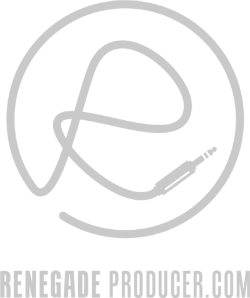25-step music production process checklist and video workshop >>>
The Importance of Audio Ear Training for Music Producers & Audio Engineers:
Discover How to Train Your Ears for Music Production With Ear Training Exercises Using Professional Frequency Ear Training Software
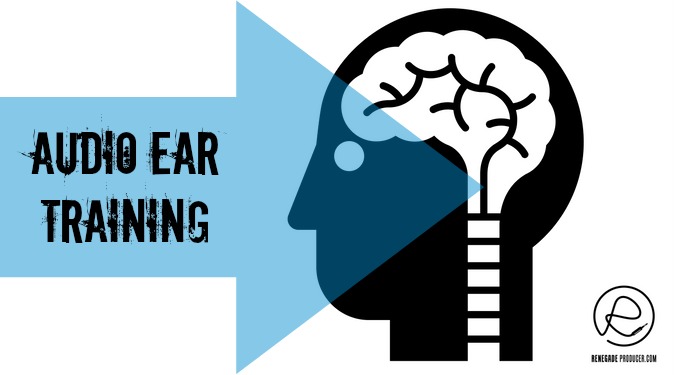
Regular audio ear training is one way to initiate yourself into the subtle art of critical listening, a skill fundamental to your long-term success and survival as an audio engineer or music producer.
"Hello, Cloth Ears!"...
My first intro into audio ear training all started back when my Sound Engineering lecturer back in the first year of college, a giant named Ari who is about 100 times my size, would often jokingly greet me with a smack on my skinny shoulder and a loud "Hello, Cloth Ears!". This did however, apart from sending me flying over the cheap Behringer desk in the Pro Tools studio, make me realize - he had a point. I couldn't tell 1kHz from 100Hz if my life depended on it back then. That had to change!
Fast forward to three years later and, at the end of my studies, I was of
course much better and more confident at recognizing and adjusting frequencies. What was
the difference? I had some training behind me. That's all.
Yes,
we got the obvious frequency charts with classical instruments broken
down but this made little difference to my practical tracking and mixing
skills. You see, a chart is a nice way to get an idea of which
frequencies are prominent in the sound of various instruments but it
does not help you recognize specific frequencies in different contexts. What I needed was on-the-job and deliberate training!
Good critical listening skills are difficult to develop for the simple reason that your
nervous system can and will play tricks on your conscious mind. You
don't have to be an expert in psycho-acoustics to know this. Ever gone to
bed safe in the knowledge that the mix is pretty much nailed, only to
experience utter shock and horror when you first play it back the next
morning?
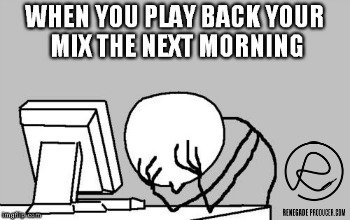
Your nervous system can and will adjust the way you perceive sounds. It's your job to train your mind to compensate for this with various frequency ear training techniques. This includes audio ear training on a regular basis because it helps you tune your hearing to a correct frame of reference.
Meet Mr. Golden Ears...
A top-class engineer such as Tony Maserati or Bob Clearmountain sits between the speakers and listens with a deep look of focus, then reaches over and twists one pot on the mix console 5mm to the left, listens again and grins lightly with satisfaction. The uninitiated person standing right next to him sees this but cannot hear any difference in the mix.
What's going on here? The experienced mix engineer has a complex reference structure built up in their psyche that allows them to hear subtle differences most people would be hard-pressed to notice. Mr Golden Ears has the ability to recognize frequency changes, subtle distortion, level changes and noise often inaudible to the ordinary layperson.
This ability to discriminate was built up over many experiences which helped the brain to refine the way it notices and pays attention to sound and music. Day in and day out and year after year the engineer trains their ears with countless tiny adjustments to sounds they worked with in different mixes.
You'll notice an improvement in your critical listening skills as you mix more and more records. This is on-the-job training and it's great because it also means you get some actual production work done! There are however more intense training options available that allow you to improve your critical listening skills much faster than you would with on-the-job ear training alone.
Why is ear training important for audio engineers and producers?
The main benefits of frequency ear training for audio engineers and music producers include:
- You get to know the audio frequency spectrum. This improves your ability to spot issues and helps you make more effective mixing decisions, faster.
- You become better with using your equalizers and balancing your mix levels.
- You learn to hone in on frequency imbalances by ear. This speeds up your sound design and mixing workflow by reducing the need to sweep your EQ.
What's the best way to ear train as a producer or audio engineer?
The best way to train one's nervous system to
recognize frequencies is to work with test tones, noise or music and use
various EQ tools to alter the sound. You need to adjust your sources
and take note of what you hear. You have to learn how to really listen
and then connect what you hear to what you know about frequencies and
EQ.
This takes time. It never stops in fact. Ear training of
course happens every time you mix or design sounds. You will however get
much better at critical listening when you add deliberate audio ear
training exercises to your list of habits.
I mean if the mix engineering legend that is Dave Pensado does it, who are we mere mortals to argue?...
Did you catch the part at about 3:22 in the video where he mentions that low-end information starts much higher than one might think it does? Another example of your nervous system playing tricks on you!
The audio ear training exercises shown by Dave Pensado in the video along with regular mixing will quickly work to improve your critical listening, sound design and music mixing skills. I still do this type of audio ear training every now and then when I have some free time on my hands.
A Few Audio Ear Training Tools:
Ear training with a book and CD:
A few years back I was sent a copy of "Critical Listening Skills for Audio Professionals" by F. Alton Everest, which is a book and CD which provides a good range of critical listening exercises.
I'm not sure if it's still in
print but it covers a range of audio listening skills essential to good
mixing. The only problem I find with the book and CD method is that tend not
to come back to it often enough! I mean come on... CD?! Don't get me wrong, this is an excellent resource so I still advise you use it if you can get a copy.
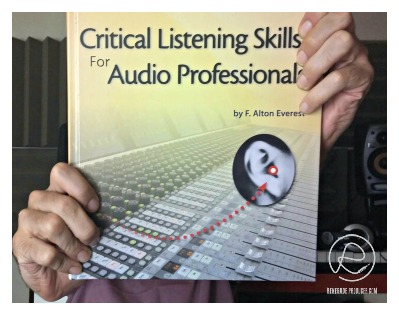
If a book and CD feels a bit too old-school for you then software may be a better option...
Ear Training Software:
I've recently started to use audio EQ training software that's been around for a while called
TrainYourEars.
The exercises in this program allow you to practice
various critical listening and mixing skills using noise or music you've
imported into the program, in a quiz format. It's actually quite
addictive. It adds randomization and the surprise-factor into the
training process, which is difficult to achieve by yourself.
This software quickly made me realize after the first use that
my ability to estimate the width of a Q-factor setting needed some
serious work, so this is where I will focus until I see improvement.
You
can edit the exercises or create your own if you find the examples
included with the program to be too easy for you. I've not yet reached
that stage but it's good to know that it's possible to increase the
difficulty in future.
I like to do 5 minutes of the basic audio ear training before I
start mix work. It seems to calibrate my mind for the mix process by
giving a mental point of reference. Now, granted this may only be
subjective but, hey, that works for me!
This tool more than covers the main
areas of training I want so I'm pleased I've found it. I might post a review of the software here when I have some time and I've
used it for a bit longer as I think producers will benefit from regular
training with the program. You can check out my review of TrainYourEars here if you want to know a bit more before you get it.
Cloth Ears No More!
Critical listening is vital to our craft. Audio ear training is therefore essential for beginners and a great ongoing practice for more seasoned music and audio professionals. It's simply not possible to be in the game without the ability to make quick and correct judgements about what works and what doesn't in a mix.
I suggest every music producer add regular audio ear training drills to their list of studio habits straight away!
My philosophy is to keep it 80/20 when it comes to on-the-job vs. deliberate training for the simple reason that on-the-job training, while slower, actually gets real work done too. In other words, I suggest you spend much more time producing actual tracks rather than training.
You'll improve much faster by training more often if you are a new producer or engineer however, so if this is the case then I would suggest you work in as many audio ear training drills as you can manage.
P.S. You can also get basic limited free ear training with iZotope's Pro Audio Essentials. So, no excuse not to get started!
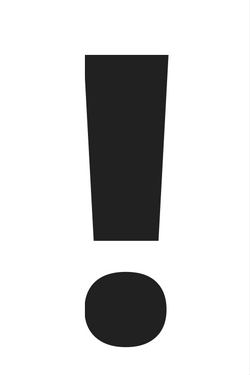
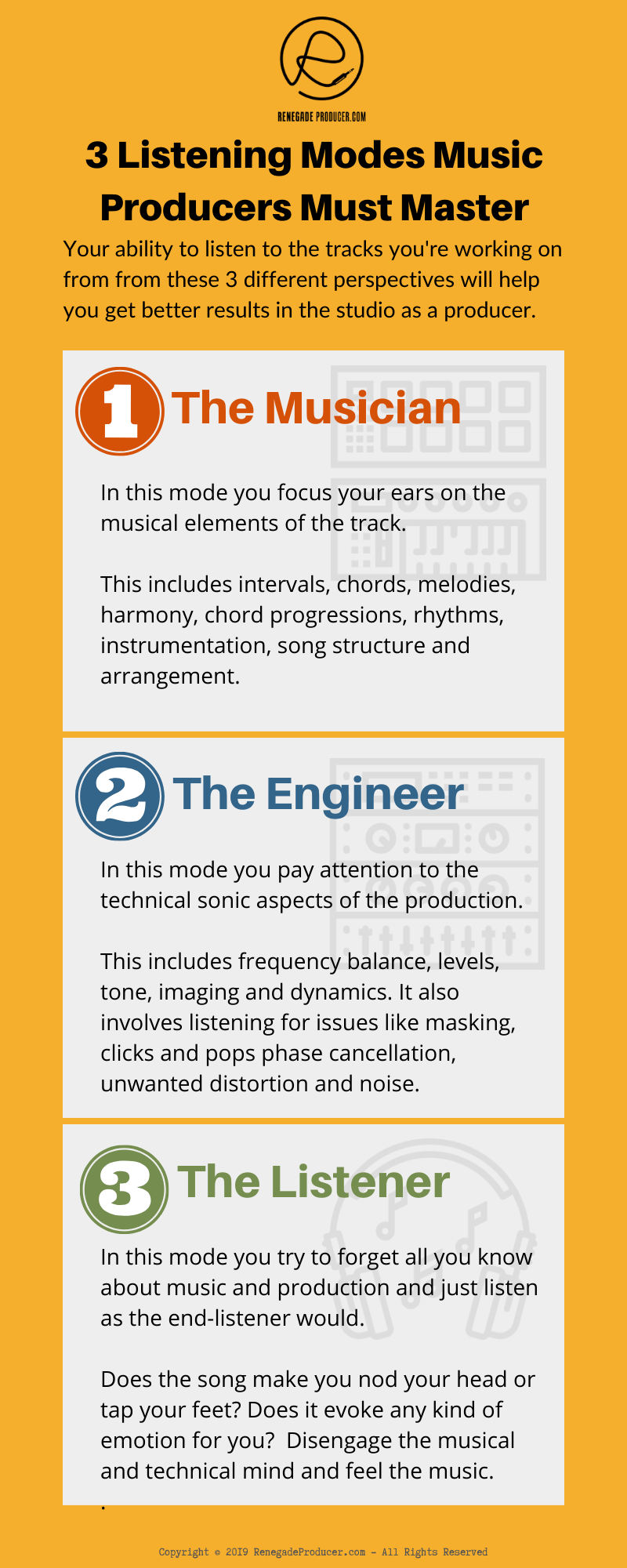

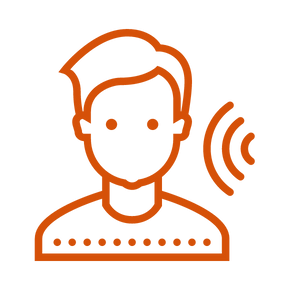
Learn to understand equalisers and frequencies to supercharge your mixing skills and get results, fast...

New producer? Learn everything you need to produce your first professional track right now...

Would you like to discover the simplest and easiest way to learn music theory as a music producer?
Share this post. Spread the knowledge so other producers can benefit too:
- Renegade Producer
- Music Production
- Ear Training
ⓘ Some pages contain affiliate links so I might earn a commission when you buy through my links. Thanks for your support! Learn more

